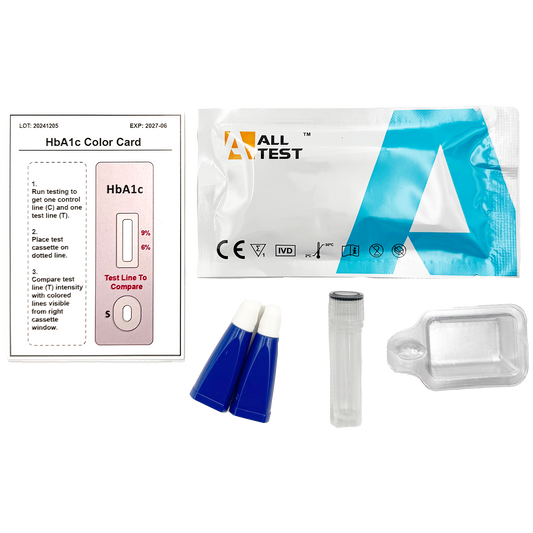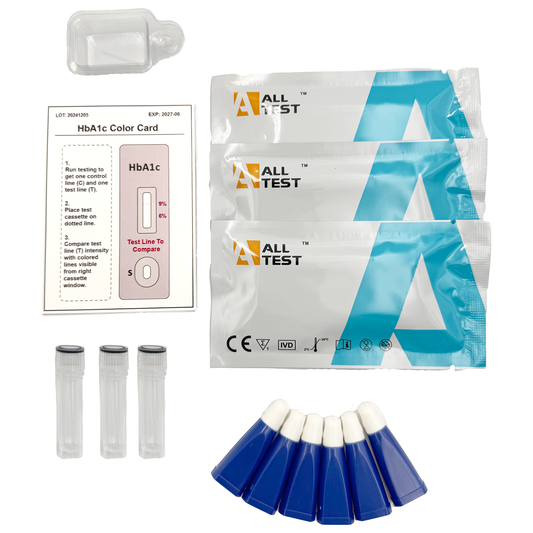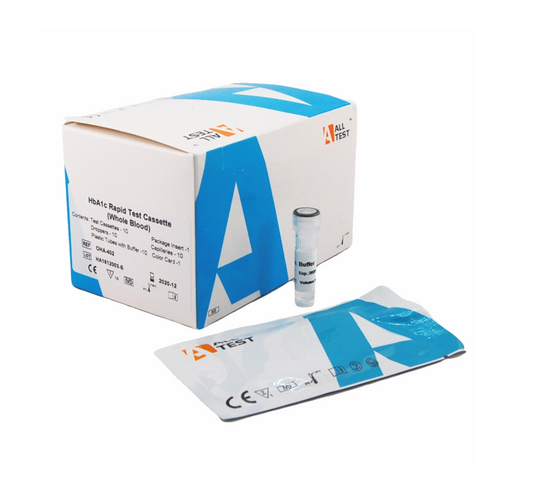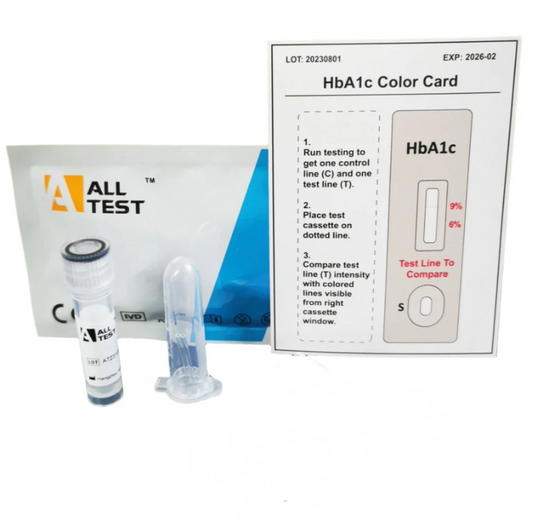Collection: HbA1C Test
-
ALLTEST Diabetes & Prediabetes Home Test Kit (HbA1c Glycosylated Haemoglobin)
No reviewsRegular price From £8.99 GBPRegular priceUnit price / per -
ALLTEST Professional HbA1c Glycosylated Haemoglobin Blood Test Kits Pack of 10 Test
1 reviewRegular price £69.23 GBPRegular priceUnit price / per£69.23 GBPSale price £69.23 GBP
HbA1c test kit
HbA1C blood test kits can be used to screen for and monitor diabetes and pre-diabetes. The HbA1C test kits involve a finger-prick blood test, and the results are provided within a few minutes. Lancets are required to obtain a finger prick blood sample.
HbA1c (also known as glycated haemoglobin or haemoglobin A1c) is a blood test that measures the average blood sugar level over the past two to three months. Haemoglobin is a protein in red blood cells that carries oxygen throughout the body. When blood sugar levels are high, sugar molecules attach themselves to haemoglobin molecules. The more sugar in the blood, the more haemoglobin molecules will be glycated.
HbA1c is reported as a percentage, with a higher percentage indicating higher blood sugar levels. For people with diabetes, HbA1c is an important tool for managing blood sugar levels and evaluating the effectiveness of their treatment plan. A goal HbA1c level for people with diabetes is typically less than 7%. It's important to note that while HbA1c provides a good overall picture of blood sugar control over the past two to three months, it is not a substitute for daily blood sugar monitoring. It is also important to interpret HbA1c levels in the context of other factors such as age, overall health, and other medical conditions.
Glycosylated Haemoglobin (HbA1c) Test FAQs
1. What is the HbA1c test?
The HbA1c test measures the average blood sugar levels over the past 2 to 3 months. It evaluates the percentage of haemoglobin in your blood that is coated with sugar (glycosylated haemoglobin). This test is commonly used to diagnose and manage diabetes.
2. Why is the HbA1c test important?
The test provides an overall picture of how well your blood sugar levels are being controlled over time. It's a critical tool for assessing the risk of diabetes-related complications, such as nerve damage, kidney disease, and heart disease.
3. How is the HbA1c test performed?
The test is a simple blood test. If you have atest with your health care provider a small sample of blood is usually taken from a vein in your arm, and no special preparation, such as fasting, is required. You can also have a test done on a finger prick blood sample using a HbA1c test kit. Although not as accurate as a test done on a larger blood sample from a vein the fingerprick test gives you a good indication of your levels and is a good screening test for raised Glycosylated Hemoglobin (HbA1c) levels in the blood.
4. What do the HbA1c results mean?
Results are expressed as a percentage:
- Below 5.7%: Normal
- 5.7% to 6.4%: Pre-diabetes
- 6.5% or higher: Diabetes
Your doctor or healthcare provider may interpret these numbers differently based on your personal medical history.
5. How often should I have an HbA1c test?
If you have diabetes, your doctor may recommend testing every 3 to 6 months to monitor your blood sugar control. For those without diabetes, it may be done as part of routine health checks or if you're at risk of developing diabetes.
6. What factors can affect HbA1c results?
Several factors can influence your HbA1c levels, including:
- Recent significant changes in blood sugar control
- Certain medical conditions, like anaemia or kidney disease
- Pregnancy (HbA1c is less reliable during pregnancy)
7. How is the HbA1c test different from daily blood sugar testing?
Daily blood sugar tests reflect your blood sugar levels at a specific moment, whereas the HbA1c test provides a long-term average. Both are important for managing diabetes effectively.
8. Can I lower my HbA1c levels?
Yes! You can reduce your HbA1c levels by:
- Following a healthy, balanced diet
- Exercising regularly
- Taking prescribed diabetes medications as directed
- Monitoring your blood sugar levels consistently
9. Is the HbA1c test suitable for everyone?
The HbA1c test may not be accurate for individuals with certain conditions, such as haemoglobinopathies, recent blood transfusions, or severe anaemia. Discuss with your doctor if an alternative test is needed.
10. Is the test available on the NHS ?
Yes, the glycosylated hemoglobin (HbA1c) test is available on the NHS in the UK. It is commonly used to:
- Diagnose Diabetes or Prediabetes: If you have symptoms of diabetes or are at risk due to factors like family history, weight, or other medical conditions, your GP may recommend the HbA1c test.
- Monitor Diabetes: If you have already been diagnosed with diabetes, the test is a key part of routine care to track how well your blood sugar levels are being controlled over time.
The test is typically ordered by your GP or diabetes care team and is free of charge as part of NHS services. Regular testing intervals may vary depending on your health status, but it is usually done every 3 to 6 months for those with diabetes.
Can I do a HbA1c test at-home?
Yes, there are home HbA1c test kits available, which allow you to check your average blood sugar levels over the past 2-3 months from the comfort of your home. These tests can be useful for people who want to monitor their diabetes more frequently or have difficulty visiting a clinic.
How do home HbA1c tests work?
Sample collection: Most HbA1c home test kits involve taking a small blood sample from a finger prick.
Home testing method:
- Some HbA1c test kits provide instant results using a small cassette device with results within 10 minutes.
- Others require you to send the blood sample to a laboratory, with results sent back to you within a few days.
Are home HbA1c tests accurate?
Home HbA1c tests can be accurate when used correctly and are approved by regulatory bodies (e.g., CE-marked kits in the UK). However, they might not be as precise as lab tests performed by healthcare professionals.
Are home HbA1c tests available on the NHS?
Currently, home HbA1c test kits are not available for free on the NHS. They must be purchased privately.
Where can you buy them?
You can purchase home HbA1c kits from:
- Ourselves Valuemed medical supplies (see above they are also available as bulk packs of 10 for clinics and also singly for home testing)
- Pharmacies like Boots or Lloyds Pharmacy
- Online retailers, including Amazon and diabetes-specific health sites
How much does a HbA1c test cost?
Prices range from £9 to £40, depending on the test kit and whether it includes lab analysis.
Should you use a home HbA1c test?
While home HbA1c tests can be helpful for additional monitoring, they are not a replacement for tests conducted by your GP or diabetes team. Always share your results with your healthcare provider for accurate interpretation and guidance. They are a useful screening tool for those who wish to screen themselves for elevated HbA1c levels, and may not be eligible for testing on the NHS or would like to test themselves more frequently to monitor response to dietary modifications.




